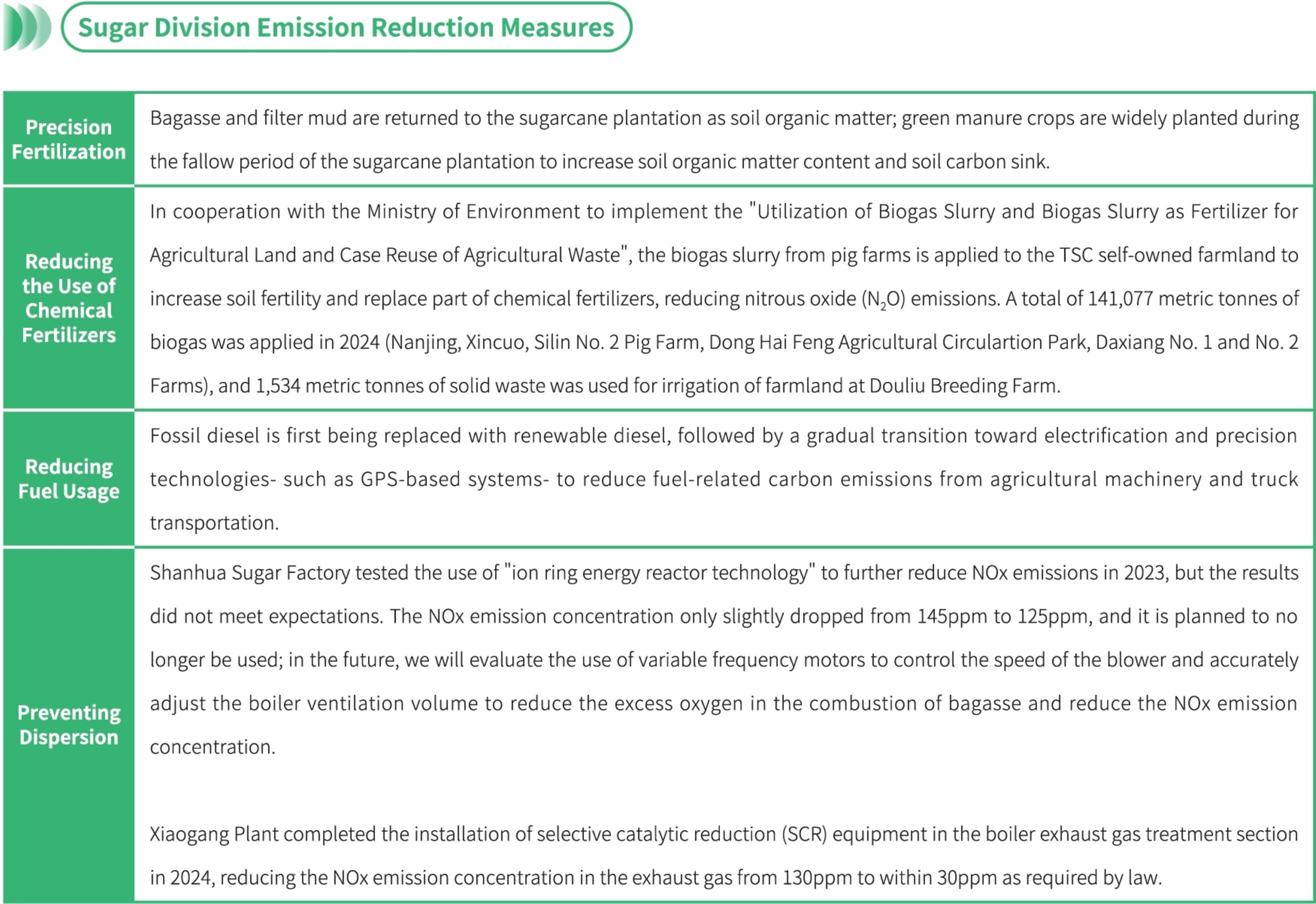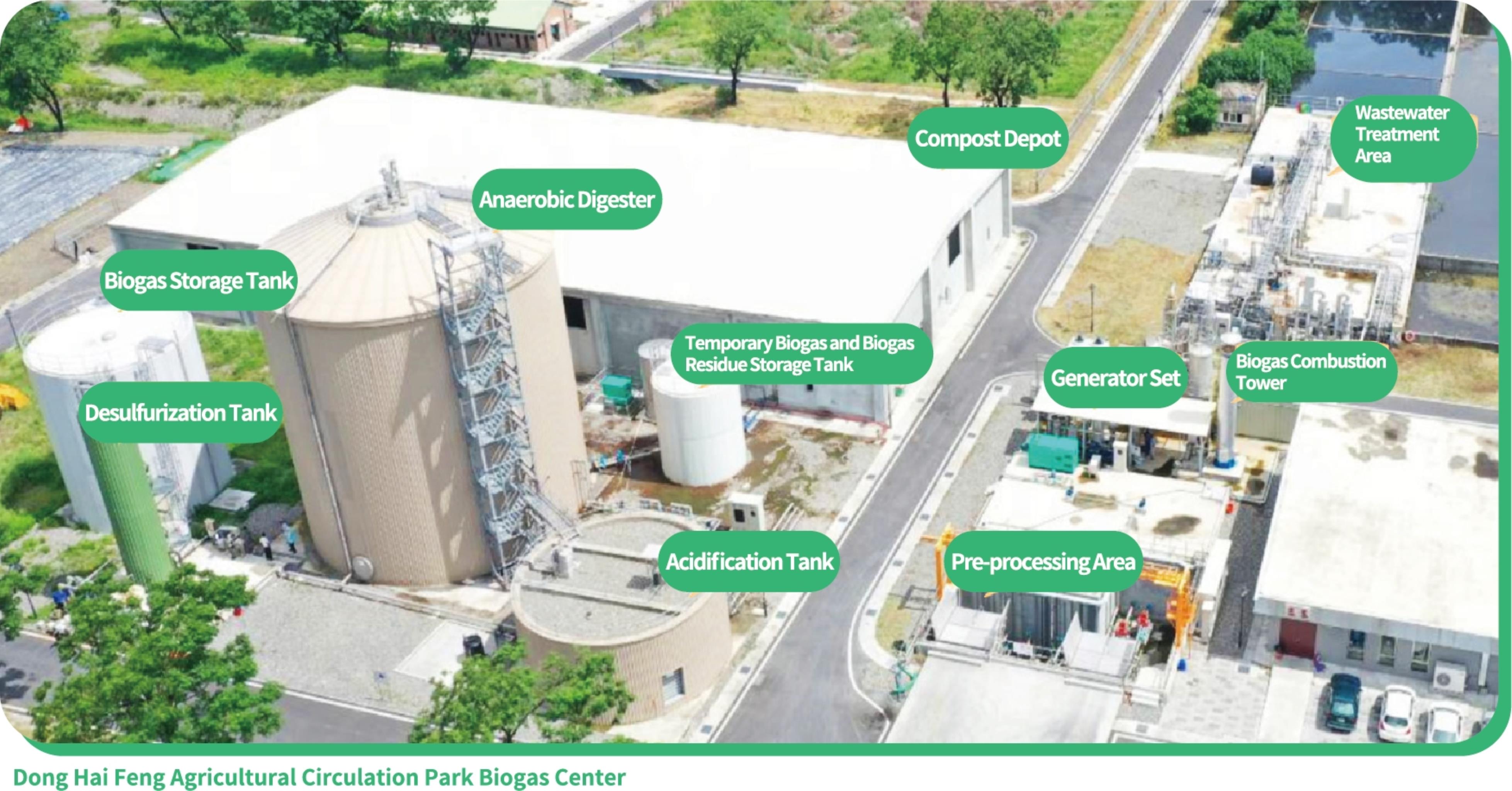With its long-standing expertise in biorefining technologies, TSC continues to invest in the research of various types of biomass materials and actively develops related derivative commercial applications, combining sugar production, pig farming, biogas generation, renewable energy, and organic fertilizer into a symbiotic system to promote the circular economy of agriculture and livestock, with the goal of transforming into a green sustainable circular industry with "zero waste" and "zero pollution".
Low-Carbon Sugar Production
Nitrous oxide (N2O) is the third most significant GHG, with the majority of global emissions originating from agricultural nitrogen fertilizers. Therefore, although the sugarcane grown by TSC belongs to C4 plant with high-efficiency carbon fixation capabilities, the potential carbon emissions during the fertilization process cannot be ignored. The Sugar Business Division aligned with the three main axes of the agricultural net zero emission strategy: "emission reduction", "carbon sequestration enhancement", and "resource circularity" to reduce the overall carbon emissions from sugarcane planting to sugar refining, and gradually move towards the goal of net zero emissions.
Note :Plants undergo photosynthesis, utilizing sunlight to convert carbon dioxide from the air and water from the soil into carbohydrates. There are generally three types of known photosynthesis in plants: C3, C4, and CAM (Crassulacean Acid Metabolism). Over 90% of plants on Earth are C3 plants, such as rice, wheat, soybeans, and potatoes. These plants produce a three-carbon compound as the initial product after absorbing carbon dioxide. In contrast, C4 plants, such as corn, sugarcane, sorghum, and Bermuda grass, produce a four-carbon compound as the initial product. C4 plants possess an enzyme called phosphoenolpyruvate carboxylase (PEP carboxylase), which enables efficient capture and utilization of carbon dioxide within the plant, facilitating faster carbon dioxide transfer and reducing water loss during transpiration. Consequently, C4 plants exhibit higher photosynthetic efficiency and more efficient water usage compared to C3 plants. Research indicates that C4 plants require only one-third of the water consumed by C3 plants.
Despite the fact that the cogeneration system in Huwei Sugar Factory obtained the Renewable Energy Certificate (REC) in 2024, it is already relatively old equipment with an electricity conversion efficiency of less than 25%. In addition, due to safety considerations, it currently only operates at 80% of the installed capacity of 4MW for power generation. In the future, a gasification furnace will be evaluated to replace the existing bagasse direct-fired boiler to improve energy efficiency and match it with a new turbine generator to maximize power generation. It will not only provide the steam and electricity required during the start-up period, but also process local agricultural waste and thinning materials at other times. The biochar produced by the boilers will be returned to the field to increase the soil carbon sink in the sugarcane plantation, and then connected to the Taiwan Power Company’s power grid to sell the surplus electricity, promoting the integration of energy and environmental policies.
Low-Carbon Pig Farming
Biogas generated through the fermentation of pig manure and urine contains a high concentration of methane. Methane is more harmful to the greenhouse effect than carbon dioxide. In order to reduce the impact on the environment, the Livestock Business Division has successively renovated its pig farms, replaced the original wastewater treatment and aeration system with an anaerobic system, and installed biogas recycling equipment to properly collect biogas for power generation or heat generation, turning it into green energy to prevent it from escaping directly into the atmosphere, reducing carbon emissions generated during pig breeding, protecting the environment and loving the earth, and enabling coexistence of the pig farming industry and environmental protection, a concept that can be described as "low-carbon pig farming."





